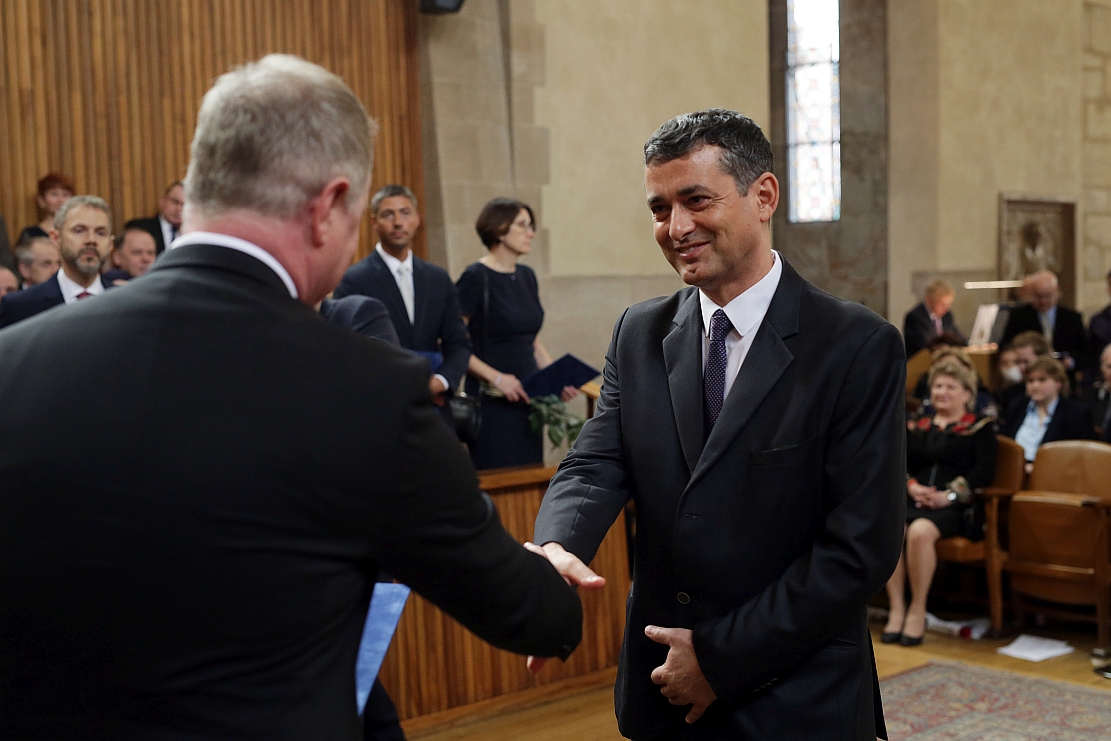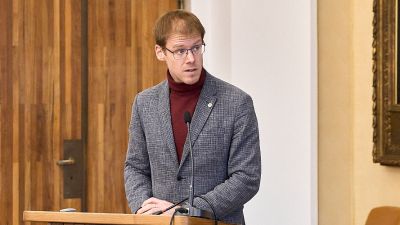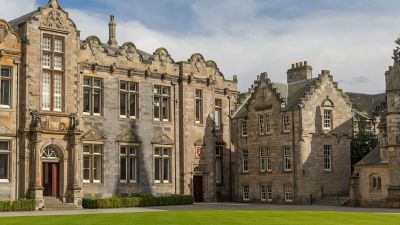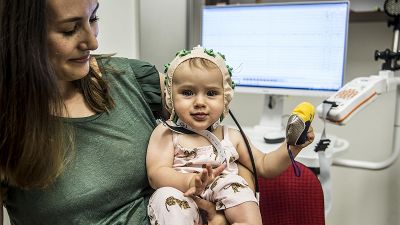Charles University recently hosted a conference in the Hall of Patriots outlining the scope and direction of a major research project that received half a billion crowns in funding last year. Co-financed by the EU, Beyond security: The role of conflict in building resilience (CoRe) will bring together a myriad of studies by numerous participants, across disciplines, to examine the impact of crises.

Project coordinator Petr Kratochvíl was one of the speakers at the CoRe conference on 9 February at the Hall of Patriots. Photo by Martin Hundák.
Friday saw the official launch of the research project CoRe, one of 15 projects that succeeded in the Top Research Call in the Jan Amos Comenius Operational Programme last year, aimed at supporting excellence in Czech research. In response to the war in Ukraine, the current climate, energy and migration crisis, researchers aim to study mechanisms across disciplines that affect or strengthen resilience of society to continuing conflict. The five-year project, powered by almost half a billion crowns, will bring together more than two hundred scientists from nine institutions coordinated by the Faculty of Arts of Charles University. Other crises that will be given proper attention, participants indicated, are the pandemic which hit in 2020 as well as the unprecedented tragedy at the Faculty of Arts on 21 December 2023 where 14 people died. Security and resilience are now topics at the front of many peoples’ minds, as is the painful realisation that horror and aggression are not the domain only of ‘other‘ countries, but just as easily can strike right at home. The scope, in its multi- or interdisciplinary aspects, is nothing if not ambitious, the half-day conference revealed. Project coordinator Petr Kratochvíl discussed the project, as did Faculty of Arts Vice-Dean Jan Čermák: both welcomed esteemed guests in person and online. The vice-dean:
“The launch of this project – and a return to research after the tragic events that unfolded on 21 December – has added symbolic meaning for us. [The very name of our project] has taken on added connotations and resonance and raises questions about where central elements and the periphery lie.”
The aim, from the start, the vice-dean said, was to examine the connection between conflict and resilience, influenced by the unprecedented aggression in Ukraine but also the climate, energy, and other outstanding issues. Essentially difficult or shocking crises can - paradoxically - have a net positive impact: boosting resilience, presumably in the long run. Adversity or aggression, while devastating, set other forces or responses in motion, such as the desire to prevail and to overcome.

Vice-Dean for Research at the Faculty of Arts Jan Čermák in 2022. Photo by Hynek Glos.
Nine speakers – discussing individual projects – presented their perspectives over the course of the morning, outlining aspects of research to be covered: everything from conflict and resilience in political crises and geopolitics to manipulation and disinformation and the impact of changing technology. From numerous interdisciplinary standpoints, bringing together sociology, religion, philosophy, ethnology, linguistics, history, and more. (Note: anyone with an understanding of Czech, who wants to learn more, can watch the conference in full at the bottom of the page).
Conflict can have early roots, even, as something as seemingly innocent as the spoken word. One of the researchers who spoke on Friday was Kateřina Chládková, known for her work with children and her focus on language acquisition. Her presentation was titled “Conflict in communication: multilingualism and psycholinguistics”. Using clips of foreign speakers with heavy accents, she demonstrated how easily domestic listeners could make false assumptions, jump to conclusions, or simply fall back on default positions, based on another person’s speech, ie. poorly spoken Czech. A heavy accent, awkward pronunciation, and other factors outline the speaker as something 'other', not part of one’s regular experience, which may lead to misunderstanding and distrust. As is often the case, exposure to multiple accents, cultures, differences, from early childhood, are defences or certain inoculation against later stereotypes and prejudices. Part of her and her team’s research will be to examine ways society can break down barriers and boost greater understanding and tolerance.

Scientist Kateřina Chládková has done extensive research into how languages are acquired from the earliest age.
After her presentation, Forum magazine asked her to elaborate on how accents invite certain responses.
“Two things come into play: one, when you first hear someone speaking with an accent, the first thing you do is try and place where they are from. Why are they speaking differently? Do they have a speech impediment? Is something the matter? Two, if they speak really poorly, they can be impossible to understand and that is frustrating. If I don’t understand someone at all, the response is not to trust them and if they are talking to me over the phone, as in the example I gave, to reject them and hang up.”
Forum: Is it that a normal reaction? Is there some kind of subconscious tribalism at play?
“There is an immediate understanding that they are from ‘outside’ of your group, something deeply ingrained through evolution. We instinctively distrust what we don’t understand… Our research among children in bilingual settings reveals that there such reactions become far less pronounced. That didn’t come up in certain studies in the US or Canada, where some people are already multilingual, or if they don’t speak the language, are aware of their different backgrounds or heritage. I think that exposure to multiple languages for Czech children could be positive. It’s not a matter of erasing variability in society, but the opposite. It is important for us to become more used to foreign speakers and for society to be more accepting and understanding. An audio application and videos we will be presenting within our project will put faces to accents and show listeners who the speakers are. People. Who shouldn’t be rejected because they speak a little differently or with an accent.”
Forum: As you spoke today at the podium, I couldn’t help but think of a situation I saw where the paradigm was turned on its head: it was a supermarket where an African cashier, despite a heavy accent, went out of his way to be friendly and even entertaining to clients waiting to pay. Especially in contrast to the cliché of the grumpy Czech cashier common at the time, he overcame any prejudices, it seemed, with grace and humour... and won people over.
“From the sounds of it, he did a lot of work for us to change perceptions. It brings to mind another point – one we would also like to examine in our research, that is, when the situation is reversed. Many Czechs go abroad to work or study and suddenly they are the ones who find it difficult to express themselves in a foreign language. Suddenly, they are the ones at a disadvantage. When they return to Czechia, later, they tend to be more tolerant, having experienced the [shoe on the other foot].”
As it stands, a lot of fascinating work lies ahead for all researchers involved in Beyond security: The role of conflict in building resilience. The scope of the project and dedication by all involved promises what could be remarkable results across multiple fields. Expect to read much more about related research here, on the pages of Forum, over the next few years.
Název a registrační číslo projektu: Za hranice bezpečnosti: role konfliktu v posilování odolnosti, Reg. č. CZ.02.01.01/00/22_008/0004595




















